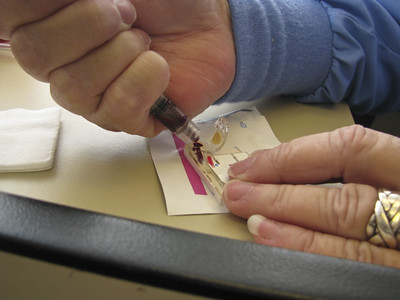Can an Equation to Help Determine Kidney Health Be Racist?
By Jill Neimark,
Undark Magazine
| 01. 26. 2022
A reckoning in medicine has upended the use of race in calculating kidney function, spurring institutional change.
"creatinine" by Lori Greig is licensed under CC 2.0
On the morning of June 19, 2020—Juneteenth, now a federal holiday — students in the Internal Medicine Residency Program at the University of California, Davis gathered for weekly rounds. Rachael Lucatorto, the associate program director, opened the session by playing a recording of the Emancipation Proclamation. She then jumpstarted a discussion about racism in medicine.
For Bisrat Woldemichael, then a fourth year medical student at UC Davis and now a resident at Emory University, it was a chance to speak about racism in kidney care, or nephrology. Black Americans experience kidney failure nearly four times as often as White Americans. And yet they are less likely to receive timely referrals to a specialist.
One big problem, Woldemichael remembers pointing out that June morning, was that a common tool for measuring kidney health factored in race. “Racism is very obviously present in a lot of ‘objective’ data in medicine,” she says. Many equations and guidelines adjust for race, and while it is sometimes a convenient proxy, critics say...
Related Articles
A Review of Exposed by Becky McClain
“Do not get lost in a sea of despair. Be hopeful, be optimistic. Our struggle is not the struggle of a day, a week, a month, or a year, it is the struggle of a lifetime. Never, ever be afraid to make some noise and get in good trouble, necessary trouble.”
— John Lewis
Becky McClain became famous when she successfully sued Pfizer, one of the very largest pharmaceutical and biotech companies. She...
By Josie Ensor, The Times | 12.09.2025
A fertility start-up that promises to screen embryos to give would-be parents their “best baby” has come under fire for a “misuse of science”.
Nucleus Genomics describes its mission as “IVF for genetic optimisation”, offering advanced embryo testing that allows...
By Katherine Long, Ben Foldy, and Lingling Wei, The Wall Street Journal | 12.13.2025
Inside a closed Los Angeles courtroom, something wasn’t right.
Clerks working for family court Judge Amy Pellman were reviewing routine surrogacy petitions when they spotted an unusual pattern: the same name, again and again.
A Chinese billionaire was seeking parental...
By Tina Stevens, CounterPunch | 12.11.2025
Silicon Valley and other high tech billionaires are investing millions in start-ups dedicated to creating genetically engineered (GE) babies, according to a recent Wall Street Journal (WSJ) report. AI mogul Sam Altman, cryptocurrency entrepreneur Brian Armstrong, venture capitalist Peter...




